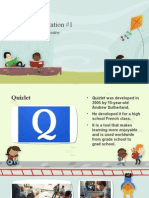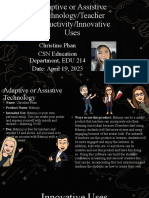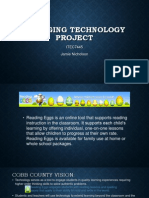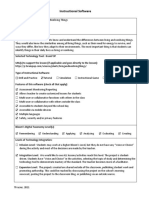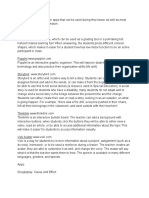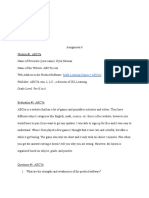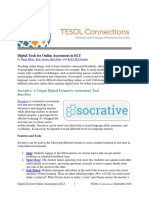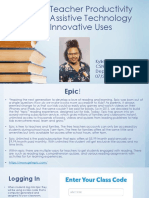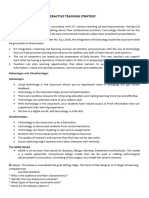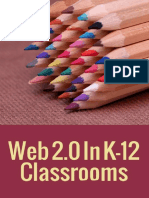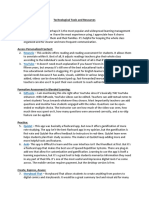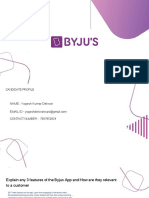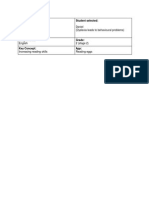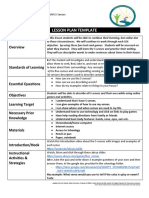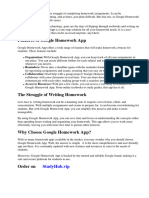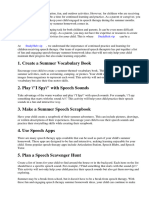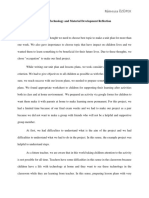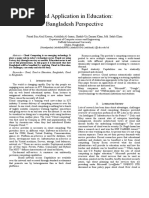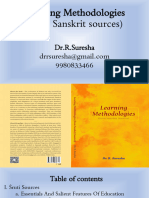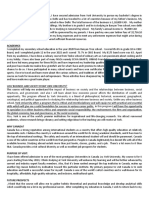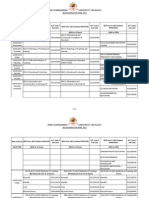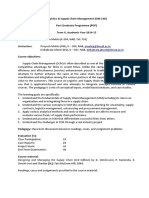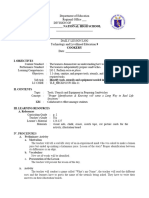0 ratings0% found this document useful (0 votes)
18 viewsBest10apps 231010202957 75435d8c
Best10apps 231010202957 75435d8c
Uploaded by
MICHAEL OGSILAThe document summarizes several educational technology applications that can be used to support student learning, including Prodigy, Pink Cat, ABCya, PBS Kids, Epic, Starfall ABCs, Brain Pop, GoNoodle, and Khan Academy Kids. Each app is described briefly, along with a rationale for how it could be used in the classroom or to support learning goals. Key features discussed include being free or low-cost, having curriculum-aligned content, tracking student progress, and protecting student privacy and data.
Copyright:
© All Rights Reserved
Available Formats
Download as PPTX, PDF, TXT or read online from Scribd
Best10apps 231010202957 75435d8c
Best10apps 231010202957 75435d8c
Uploaded by
MICHAEL OGSILA0 ratings0% found this document useful (0 votes)
18 views22 pagesThe document summarizes several educational technology applications that can be used to support student learning, including Prodigy, Pink Cat, ABCya, PBS Kids, Epic, Starfall ABCs, Brain Pop, GoNoodle, and Khan Academy Kids. Each app is described briefly, along with a rationale for how it could be used in the classroom or to support learning goals. Key features discussed include being free or low-cost, having curriculum-aligned content, tracking student progress, and protecting student privacy and data.
Original Title
best10apps-231010202957-75435d8c
Copyright
© © All Rights Reserved
Available Formats
PPTX, PDF, TXT or read online from Scribd
Share this document
Did you find this document useful?
Is this content inappropriate?
The document summarizes several educational technology applications that can be used to support student learning, including Prodigy, Pink Cat, ABCya, PBS Kids, Epic, Starfall ABCs, Brain Pop, GoNoodle, and Khan Academy Kids. Each app is described briefly, along with a rationale for how it could be used in the classroom or to support learning goals. Key features discussed include being free or low-cost, having curriculum-aligned content, tracking student progress, and protecting student privacy and data.
Copyright:
© All Rights Reserved
Available Formats
Download as PPTX, PDF, TXT or read online from Scribd
Download as pptx, pdf, or txt
0 ratings0% found this document useful (0 votes)
18 views22 pagesBest10apps 231010202957 75435d8c
Best10apps 231010202957 75435d8c
Uploaded by
MICHAEL OGSILAThe document summarizes several educational technology applications that can be used to support student learning, including Prodigy, Pink Cat, ABCya, PBS Kids, Epic, Starfall ABCs, Brain Pop, GoNoodle, and Khan Academy Kids. Each app is described briefly, along with a rationale for how it could be used in the classroom or to support learning goals. Key features discussed include being free or low-cost, having curriculum-aligned content, tracking student progress, and protecting student privacy and data.
Copyright:
© All Rights Reserved
Available Formats
Download as PPTX, PDF, TXT or read online from Scribd
Download as pptx, pdf, or txt
You are on page 1of 22
There’s an app for that!
Education & Technology
The intentional use of
technology applications
allows for students to
navigate online tools in a
safe and learning
environment. Students
exposure to technology,
allows for digital literacy and
for real world experiences to
meet the child’s learning in
the classroom.
Prodigy
• Prodigy is an application that is free to
students and teachers. A subscription
however, provides unlimited access to
other games and features. Prodigy is in
the format of a story game, where
wizards cast spells over correct answers
and pick animals to go along with their
math and literacy journey.
Rationale
• Prodigy tracks a student’s mastery of skill and levels them on. The
teacher can also access information on what level the student is on.
This allows for adaptability from the teacher to meet the student
where they are at in their learning. The teacher can also assign
specific standard-based lessons to an individual student. Lastly, the
teacher gets a weekly report on where the student is at in the
learning course.
• The app is easy to use, it uses the answer a question and play
method, so students know what to do when a question is shown on
their screen. The app also has a feature where students are read the
questions to and can freeze the screen and use drawing features to
work out the questions.
• Prodigy allows users and parents to correct or delete personal
information they do not wish to share from the data.
Pink Cat
• Pink Cat is a free website that offers over 200
math and ESL games and questions created
by teachers. Pink Cat is also fitting for SLPs
and Special Education students. With Pink
Cat, teachers have the ability to assign
lessons to the students or let the students
have free choice and pick their own learning
games.
Rationale
• Pink Cat allows for fluency math and reading practice. The questions in this
app are focused on speed and accuracy. It is intended for whole group, small
group, or independent group use. Pink Cat does not provide feedback as data
to be reviewed but it does go back and show the student the correct
answers. Pink Cat is intuitive with drag and drop features and option based
questions.
• Pink cat does not advertise information or sell, they are also, “COPPA, FERPA,
and GDPR compliant.”
• The skills that Pink Cat highlights are developmentally appropriate, however,
Pink cat does not follow a set curriculum, just grade level appropriateness.
Pink Cat is easy to follow, the student begins by selecting their grade level
and picks a game according to that level.
ABCya!
• ABC ya is a free website that carries over
300 learning games that are catered to
students in PreK all the way up to 6th grade.
There is a variety of topics the student can
pick from such as: math, science, and
reading. This introduces a different style to
learning about these school subjects.
Rationale
• Abc Ya! Follows a curriculum standards game selection. The selection includes:
math, reading, skills, holiday, and strategy games. This app does not give
feedback but it does list what exact learning targets the student is working on
within the game chosen. The app has a section for skills and strategies that
encourage critical thinking and problem-solving skills, outside of school
subjects.
• ABC Ya is easy to use, except for it doesn’t read the instructions to the students.
They have to read the instructions to play.
• ABC Ya does collect information, however it does not share that information
with other sites. The app overall is very user friendly and it allows the parents
to know exactly what skill targets their student is working on when they play on
ABC Ya.
PBS KIDS
• PBS KIDS is an application that
allows students to explore “360
learning” through educational
games and educational videos
that cater to a student’s learning
through the exploration of new
topics, critical thinking, and
educational storytelling.
Rationale
• A specific use in the classroom for PBS is for independent time or for
research purposes. PBS kids has shows that are catered to learning about
topics that could be used for real life application knowledge in the classroom.
PBS Kids does not provide feedback but it does however it does encourage
real life skills.
• The app is easy to use the layout is simple: games or videos. The app is set up
to where the student can pick a character and then the various activities that
have to do with the character show up. The app uses audio instructions
within the games and videos, therefore making it easy for a child to navigate.
• PBS protects the users name, birthday, and other information- that isn’t
information being shared.
epic!
• Epic is a free app that allows the
students to have access to free books.
This platform gives access to
audiobooks, independent-read books,
books that are read to the student, and
videos that cover educational topics.
Epic has a variety of topics and
language options. This platform also
offers quizzes, personal libraries, and
allows parents or teachers to assign the
student a book.
Rationale
• Epic can be used during reading time in a classroom, or center time, it can be
a replacement for a hardcopy book, since epic provides more features and
easy access to literature. Epic does not provide feedback, however, it does
provide quizzes after certain books, teachers can use that as feedback on
reading comprehension. The app encourages students to explore related
books to the ones they have shown interest in, allow them to discover new
books.
• Epic is intuitive, and easy to use, the student picks and plays a book, the
mannerism of “turning the page” is the same as in real-life. Epic is for 24/7
use, there is a paid version that unlocks other titles.
• Epic’s privacy protection does not have ads, does not sell the information
they have, and are COPPA and FERPA compliant.
StarFall ABCs
• Starfall is a free application and is
intended for lower elementary
students to beginning readers. Starfall
focuses on letter sounds, letter names,
and word building within the student’s
grade ability. Starfall has a variety of
games that supports phonemic
awareness.
Rationale
• Starfall ABC can be used for center time, reading reinforcement, or for
individual use. The games do not provide feedback but do have
developmentally appropriate games for emerging readers.
• The app encourages visual and auditory senses to learn new words,
sounds, and it is interactive and allows the student to participate in
picking answers. Starfall is easy to use, the student clicks on the
highlighted areas to advance in the videos, and can pick games to
play.
• Starfall ABC does not sell information and does not contain ads.
Brain Pop
• Brain Pop is catered mostly for schools but it
also has a feature that can be used at home
for families. For teachers, Brain Pop has a
variety of grade level curriculum-aligned
videos with quizzes and activities. The teacher
can assign those or do them as a whole group.
The app is also designed to track the student’s
learning targets through the quizzes and
activities provided on the platform.
Rationale
• Brain Pop can be done as a whole group or independent work, it can also serve as
data intake for teachers. When the quize is done, it shows the student the correct
answer and gives them a grade. This allows the student to look back and reflect on
what they missed. Brain Pop has learning targets that are in the student’s grade
level, it is intereactive- is stops and asks the student real life questions to engage
them and create a conversation about the learning in the classroom. This app is
easy to use, but it is intended for more independent readers such as third grade
and up.
• The privacy policy offered is that Brain Pop does not sell your information and
follows the COPPA and FERPA policies. The data collected by the app is also,
limited.
• The app has intuitive directions, during the video it will pause itself to create critical
thinking within the student.
GoNoodle
• GoNoodle is a free app, there is a school
version that provides other features and
content. GoNoodle is catered to the
Music and Arts aspect of learning. The
main integration that GoNoodle adds is
music and movement. There is a learning
section for curriculum subjects and
learning targets. Students here are
encourages to move, sing, and dance
while they learn.
Rationale
• GoNoodle is intened for movement, so in a classroom setting, I believe whole
group or small group would work. At home, students can also go back to visit the
page to do on their own time at home. GoNoodle has paper activities but it does
not provided feedback on them. The app encourages movement and verbal
engagement as a form of higher thinking and long-term memory. This app is user
friendly, although it is mostly catered to grades K-6. It is intuitive, meaning that
the student picks a video and the video tells them what to say, what to do, and
how to do it. There are sing alongs, dance alongs, interactive videos, and read
alouds on this platform of various learning subjects. what kind of privacy does it
offer?
• Go Noodle does collect and keep data from adult users such as parents and
teachers and may allow interest-related ads to pop up during the user’s time on
GoNoodle. GoNoodle does comply with COPPA.
Khan Academy Kids
• Khan academy is a learning app targeted
to students who are ages 2 to 8. This app
has no ads and is free of charge. This app
allows teachers to also make use of the
app by having curriculum related videos,
lessons, and printable work. Khan
Academy has subjects such as reading,
math, letter work, and critical thinking
activities.
Rationale
• Khan Academy can be used during independent time or small group center
time. Khan Academy reads instructions aloud to students, it is user friendly
and it allows for interactive activities, that has the student retry if they do not
show mastery in it. This app encourages students to keep learning through
the cycle path that Khan Academy math has. They follow a “path” to be able
to move onto the next curriculum-appropriate skill in the program.
• Khan Academy encourages critical thinking, logical thinking, and motor skills
through its activities.
• Khan Academy does collect some information about the adults on the
account and does sell information to “trusted vendors”. This app follows
COPPA and FERPA for school use, and for home use they do not collect
information on children younger than 13.
Barefoot World Atlas
• Barefoot World Atlas is an app designed to educate studnts about
other countries, continents, oceans, and land facts. This is meant to
bring in a 3D experience to this information with detailed facts. This
app does not contain games, it is meant for independent readers
Rationale- not finished
• specific uses in the classroom
• does it provide student feedback? how?
• what kind of higher learning thinking skills does the app encourage?
• ease of use...is it intuitive? how?
• what kind of privacy does it offer?
• are the skills reinforced connected to your curriculum
standards/student outcomes?
• does the app provide easy to follow and comprehensive instructions?
provide details
You might also like
- Edu 214 Teacher Productivity SlideshowDocument11 pagesEdu 214 Teacher Productivity Slideshowapi-622668158No ratings yet
- Edu 214 Teacher ProductivityDocument11 pagesEdu 214 Teacher Productivityapi-622637460No ratings yet
- Internship ReportDocument29 pagesInternship ReportAbraham Odoi Gerald100% (15)
- Comparative AnalysisDocument2 pagesComparative AnalysisandrewNo ratings yet
- Formal (Interaction at Workplace)Document23 pagesFormal (Interaction at Workplace)Nurul Nadia Jaafar100% (2)
- Edu 214 Technology Resources For The ClassroomDocument12 pagesEdu 214 Technology Resources For The Classroomapi-584410222No ratings yet
- Apples Guide To Teaching Wios AppsDocument8 pagesApples Guide To Teaching Wios Appsapi-256818695No ratings yet
- Adaptive or Assistive Technology Teacher Productivity Innovative Uses PresentationDocument13 pagesAdaptive or Assistive Technology Teacher Productivity Innovative Uses Presentationapi-529901664No ratings yet
- 15 Best Education Apps For TeachersDocument15 pages15 Best Education Apps For TeachersJasper YogcayogNo ratings yet
- Group Presentation #1: Emma, Charlee, Hannah, AshleyDocument24 pagesGroup Presentation #1: Emma, Charlee, Hannah, AshleyAshleyMaracleInsellNo ratings yet
- Teacher Productivity Assistive Technology Innovative Uses Slide Show Isabel Barbosa Edu 214Document11 pagesTeacher Productivity Assistive Technology Innovative Uses Slide Show Isabel Barbosa Edu 214api-570743058No ratings yet
- Digital Backpack 24 1Document41 pagesDigital Backpack 24 1api-708683496No ratings yet
- Untitled Presentation 3Document11 pagesUntitled Presentation 3api-571252616No ratings yet
- Teacher Productivity Assistive Technology Innovative Uses ProjectDocument12 pagesTeacher Productivity Assistive Technology Innovative Uses Projectapi-666637604No ratings yet
- Homework App IosDocument6 pagesHomework App Ioscqxxvzhlf100% (1)
- Assignment 10 Software Eval Mackenzie MelnarDocument10 pagesAssignment 10 Software Eval Mackenzie Melnarapi-376838532No ratings yet
- Apps For EducationDocument14 pagesApps For EducationEdjess Jean Angel RedullaNo ratings yet
- Assistive Technology UsesDocument11 pagesAssistive Technology Usesapi-610455791No ratings yet
- Homework QuizletDocument8 pagesHomework Quizletafnagyxmjdqfff100% (1)
- Emerging Technology JnicholsonDocument16 pagesEmerging Technology Jnicholsonapi-211737810No ratings yet
- m04 Instructional Software Lesson IdeaDocument2 pagesm04 Instructional Software Lesson Ideaapi-540133614No ratings yet
- Show My Homework Ipad AppDocument6 pagesShow My Homework Ipad Appafetbevvo100% (1)
- Edtc 625 Educational Apps - RollsDocument4 pagesEdtc 625 Educational Apps - Rollsapi-568822444No ratings yet
- Matrix 4Document6 pagesMatrix 4api-309449724No ratings yet
- 5e ModelDocument5 pages5e ModelMia Claril DecanoNo ratings yet
- Teacher ProductivityDocument11 pagesTeacher Productivityapi-610745533No ratings yet
- Top ToolsDocument18 pagesTop Toolsapi-379027918No ratings yet
- UnitplanappsandwebtoolsDocument2 pagesUnitplanappsandwebtoolsapi-284466853No ratings yet
- Recommendations in WeeblyDocument4 pagesRecommendations in Weeblyapi-534392057No ratings yet
- Assignment 6Document6 pagesAssignment 6api-567904583No ratings yet
- Show My Homework Teacher AppDocument4 pagesShow My Homework Teacher Appcfqgw91a100% (1)
- Homework App StoreDocument7 pagesHomework App Storejewypiv0gid3100% (1)
- 3-Digital Tools For Online Assessment in ELTDocument6 pages3-Digital Tools For Online Assessment in ELTTrương Minh ThưNo ratings yet
- App DiscriptionDocument5 pagesApp Discriptionapi-506354834No ratings yet
- English texts 2025 Lect.2Document14 pagesEnglish texts 2025 Lect.2Osama OpticsNo ratings yet
- Teacher Productivity-Assistive Technology-Innovative UsesDocument13 pagesTeacher Productivity-Assistive Technology-Innovative Usesapi-506668609No ratings yet
- 4 Technology Based Interactive Teaching StrategyDocument3 pages4 Technology Based Interactive Teaching StrategyAngco Michelle AnnNo ratings yet
- Enuma Intro Deck-MinDocument20 pagesEnuma Intro Deck-MinAini Khairiyah SharakalNo ratings yet
- Web 20 in K 12 ClassroomsDocument6 pagesWeb 20 in K 12 Classroomsapi-310296347No ratings yet
- Gamification As A Method of Teaching EnglishDocument4 pagesGamification As A Method of Teaching EnglishDiego Luna Ramirez0% (1)
- Technological Tools and Resources PDFDocument2 pagesTechnological Tools and Resources PDFRyan SweeneyNo ratings yet
- Definition of Drill and PractiseDocument12 pagesDefinition of Drill and PractiseMamokete SebeheloNo ratings yet
- Jackelyne Gomez-Cavadas EDU 214 9/29/2022Document8 pagesJackelyne Gomez-Cavadas EDU 214 9/29/20229308pinkNo ratings yet
- Iste Standards For Teachers FinalDocument13 pagesIste Standards For Teachers Finalapi-257503803No ratings yet
- YogeshDocument5 pagesYogeshYogesh DekwarNo ratings yet
- Teacher ProductivityDocument12 pagesTeacher Productivityapi-623449049No ratings yet
- Assessment Task App TaskDocument5 pagesAssessment Task App Taskapi-249580974No ratings yet
- Olivia Burd - Lesson Plan Template - 2653820 1Document5 pagesOlivia Burd - Lesson Plan Template - 2653820 1api-512851475No ratings yet
- Ed207 Ian LegoDocument35 pagesEd207 Ian LegoIan john LegoNo ratings yet
- Educational Mobile App ReviewDocument8 pagesEducational Mobile App Reviewapi-265068130No ratings yet
- Teacher Productivity Assistive Technology Innovative Uses Slide ShowDocument12 pagesTeacher Productivity Assistive Technology Innovative Uses Slide Showapi-608485727No ratings yet
- Teacher ProductivityDocument11 pagesTeacher Productivityapi-624230843No ratings yet
- Jordan Pierce Multimedia Audio or Video Lesson IdeaDocument4 pagesJordan Pierce Multimedia Audio or Video Lesson Ideaapi-724301517No ratings yet
- Homework Helpers Online FreeDocument8 pagesHomework Helpers Online Freecfp4gtpa100% (1)
- My Homework App ItunesDocument6 pagesMy Homework App Itunesafmseodmf100% (1)
- Sample of A Remedial Program Own Made-1Document22 pagesSample of A Remedial Program Own Made-1lhynnethbriola1No ratings yet
- Google Homework AppDocument7 pagesGoogle Homework Apperqk9nf9100% (1)
- Computer Education by Attaullah KhanDocument10 pagesComputer Education by Attaullah KhanAttaullah KhanNo ratings yet
- Speech Therapy Summer Homework IdeasDocument5 pagesSpeech Therapy Summer Homework Ideasers8b13w100% (1)
- m05 Basic Productivity Tools Lesson Idea TemplateDocument2 pagesm05 Basic Productivity Tools Lesson Idea Templateapi-567825063No ratings yet
- Ceit 319 ReflectionDocument2 pagesCeit 319 Reflectionapi-397169301No ratings yet
- Digital BackpackDocument16 pagesDigital Backpackapi-522336289No ratings yet
- Types of Adjectives in The Tagalog LanguageDocument16 pagesTypes of Adjectives in The Tagalog LanguageMICHAEL OGSILANo ratings yet
- Orientationonworkimmersiondocuments 2 230225072456 3347b214Document70 pagesOrientationonworkimmersiondocuments 2 230225072456 3347b214MICHAEL OGSILANo ratings yet
- Finance SignatoriesDocument2 pagesFinance SignatoriesMICHAEL OGSILANo ratings yet
- 39th Gawad Ustetika Certificate of OriginalityDocument1 page39th Gawad Ustetika Certificate of OriginalityMICHAEL OGSILANo ratings yet
- Study NowDocument24 pagesStudy NowMICHAEL OGSILANo ratings yet
- Barangay CertificationDocument1 pageBarangay CertificationMICHAEL OGSILANo ratings yet
- 4 Ucsp-Q1-W1Document20 pages4 Ucsp-Q1-W1MICHAEL OGSILANo ratings yet
- By MoonlightDocument2 pagesBy MoonlightDarren O NeillNo ratings yet
- Vignesh CV at 2019Document2 pagesVignesh CV at 2019Shivan .PNo ratings yet
- Writing Hooks Lesson PlanDocument9 pagesWriting Hooks Lesson Planapi-285059397No ratings yet
- EEI Student Application Form International UpdatedDocument4 pagesEEI Student Application Form International UpdatedT Bayu PratamaNo ratings yet
- Cdcs Exam - Google SearchDocument2 pagesCdcs Exam - Google SearchDillepNo ratings yet
- Cloud Computing Bangladesh PerspectiveDocument4 pagesCloud Computing Bangladesh PerspectiveManish ShresthaNo ratings yet
- Curriculum For Bachelor of Science in CriminologyDocument3 pagesCurriculum For Bachelor of Science in CriminologyMaimai NeriNo ratings yet
- 2ND INTERNAT Conference Call - 2024Document6 pages2ND INTERNAT Conference Call - 2024bledartoska9544No ratings yet
- Application Form For Non-Teaching StaffDocument4 pagesApplication Form For Non-Teaching StaffNitin Pandya BjpNo ratings yet
- Bes 062Document146 pagesBes 062principalNo ratings yet
- Learning Methodologies (From Sanskrit Sources)Document11 pagesLearning Methodologies (From Sanskrit Sources)Prashant ChaudharyNo ratings yet
- Table Tennis Combination RubricDocument1 pageTable Tennis Combination RubricJaime Gaviola100% (1)
- DepEd Demo Lesson PlanDocument3 pagesDepEd Demo Lesson PlanCelyn Gahol50% (2)
- Week 1 Pt. 2 - LETTER JJ - Executed - FS 3 Detailed Lesson PlanDocument7 pagesWeek 1 Pt. 2 - LETTER JJ - Executed - FS 3 Detailed Lesson PlanTey ParasNo ratings yet
- Emerging Trends in Teacher EducationDocument5 pagesEmerging Trends in Teacher EducationMuhammad Akram100% (1)
- Wenner Gren Dissertation Fieldwork FellowshipsDocument9 pagesWenner Gren Dissertation Fieldwork FellowshipsPayToWritePaperSingapore100% (1)
- Sukhveer Singh - SOP EditingDocument2 pagesSukhveer Singh - SOP EditingkabirNo ratings yet
- Name. Mehwish Gul Course: Education in Pakistan (6506) Semester: Autumn 2021 Level: M.A/M.EdDocument24 pagesName. Mehwish Gul Course: Education in Pakistan (6506) Semester: Autumn 2021 Level: M.A/M.EdAdeel AbbasNo ratings yet
- Action Plan in TlesDocument3 pagesAction Plan in Tlescarmena b. oris100% (1)
- Stanford Resumes Inter PDFDocument28 pagesStanford Resumes Inter PDFDavid Andrés Bessalle ReyesNo ratings yet
- Rani Channamma University BED April, May 2013 Time TableDocument3 pagesRani Channamma University BED April, May 2013 Time TableSiva MeruvaNo ratings yet
- PEP 101 Infant I F10 BollingerDocument4 pagesPEP 101 Infant I F10 BollingersscheinspsccNo ratings yet
- Logistics and Supply Chain Management 0Document5 pagesLogistics and Supply Chain Management 0srinivasNo ratings yet
- Tle 7 First Periodical Examination S.Y. 2019-2020Document1 pageTle 7 First Periodical Examination S.Y. 2019-2020Dondee PalmaNo ratings yet
- Tle LP 1Document2 pagesTle LP 1Elrose Jean Alloso TocaoNo ratings yet
- Prejudice and DiscriminationDocument17 pagesPrejudice and DiscriminationFiasco3030100% (1)
- Lesson Plan in Applied English 12Document2 pagesLesson Plan in Applied English 12Markaton DihagnosNo ratings yet









